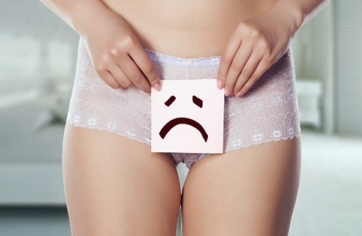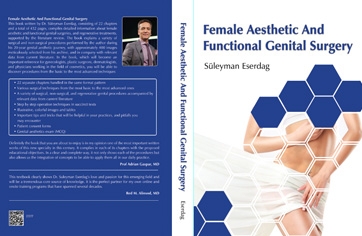Genital aesthetic surgeries provide significant benefits in functionality and beautification when applied in the right patient group. It is important for physicians working on this subject to have;
- full knowledge of female genital anatomy and physiology,
- sufficient knowledge and experience in sexology,
- a good understanding of patients' psychology.
However, in some cases, genital plastic surgery should not be performed. In this section, in which cases genital plastic surgeries should not be performed are discussed in detail. On the other hand, topics such as "why women prefer genital plastic surgery, the purposes for which genital plastic surgeries are performed, body image and self-esteem" are also discussed.
Why do women apply to genital aesthetic operations?
The first reason for women to apply to genital aesthetic operations is aesthetic concerns. Functional and sexual reasons follow. Sometimes there are also hygienic, cultural, and medical indications. These application grounds are abbreviated as 7R in English:
‘Reclaim- Restore- Revive- Rejuvenate- Renew- Reconstruct- Repair’
The biggest goal of patients who apply to aesthetic clinics is to have a better appearance and feel more comfortable psychosocially. A study observed that women with a low body mass index, attractive, self-confident, not shy towards the opposite sex, tend to improve their sexual life, and can easily find work and partners are more likely to have cosmetic surgery procedures.
Body Image
Body image is one of the most important motivational factors that arouse the desire for cosmetic surgery. It includes observations, feelings, and thoughts about one's own body. Women with a positive body image are at peace with their bodies.
Physical and psychological factors affect body image. One study observed that while women seeking cosmetic surgery were quite dissatisfied with their appearance in the preoperative period, their body images improved positively after the surgery.
Self-Esteem
Self-esteem and body image are related to each other and are affected by a cause-effect relationship. In a study, it was determined that self-esteem increased after surgical procedures for cosmetic purposes. In addition, it has been stated that the perspective of society, self-esteem, and body image are important in the person's decision for cosmetic surgery.
First Scientific Article And Literature Information In Cosmetic Gynecology
The first article on cosmetic gynecological surgeries was a case report in a North American journal in 1978. This was followed by scientific studies and articles by Hodgkinson and Halt in 1984 and Chavis, LaFeria and Niccolini in 1989 on aesthetic and sexual problems operations.
In which cases genital plastic surgeries cannot be performed?
In the following cases, genital plastic surgeries are not performed (contraindicated) and are not recommended.
Situations where female aesthetic genital surgeries should NOT BE performed are summarized at below (Contraindications of aesthetic plastic genital surgeries).
Pregnancy:
All optional genital plastic surgeries are avoided during pregnancy period.
Breastfeeding period:
Waiting at least 3-4 months after delivery is recommended, especially for vaginal tightening and labiaplasty procedures.
Existence of active HPV (Human Papilloma Virus) or HSV (Herpes Simplex Virus) infections:
To prevent the spread of active HPV or HSV infections, it is more appropriate to treat the lesions first and perform the aesthetic genital aesthetic operation(s) later.
Uncontrolled Diabetes (DM):
Genital aesthetic surgery is not recommended without blood glucose regulation as it will adversely affect wound healing. The situation is the same for patients with impaired glucose tolerance.
Morbid obesity (Body mass index > 40):
Although not an absolute contraindication, morbid obesity may interfere wound healing. In addition, due to hygienic reasons, the risk of developing infection increases slightly.
Body Dysmorphic Disorder (BDD):
Body Dysmorphic Disorder (BDD) is a condition that should be evaluated well prior to surgery. This group of patients may have dissatisfaction and different emotional changes after surgery. In doubtful cases, psychiatry consultation is requested before the operation.
Having psychiatric or severe psychological disorders:
Conditions such as depression, anxiety, and OCD (Obsessive-Compulsive Disorder) are important for doctors choosing patients. Associating psychological problems with the genital area can cause an increase in emotional problems after surgery. In addition, genital plastic surgery procedures are not applied in patients diagnosed with psychosis, bipolar disorder, severe depression, and eating disorders.
Mentally handicapped:
All aesthetic operations are contraindicated in people with mental disabilities, and genital plastic surgeries are not performed.
Cancer or suspected cancer:
Vaginal laser applications should not be performed, especially in those who have abnormal cellular pathology in their genital areas due to the effect of HPV (Human Papilloma Virus). Apart from that, surgical and non-surgical genital plastic surgeries should be avoided in cases of genital cancer or pre-cancerous conditions that are not fully diagnosed.
Over-expectant:
Just as the patient has the freedom to choose the physician, it is natural for the physician who will perform the aesthetic surgery to choose the patient. Patients with excessive expectations, excessive detail, indecisiveness, mental conflicts, or insecurities may not be accepted for genital plastic surgery. The satisfaction levels of such patients after surgery are also extremely low. On the other hand, many patients do not know precisely what they are looking for, even though they apply to the doctor. Marital problems, cheating, depression, general anxiety disorder, or different psychological disorders may lie behind this search.
Are formation of hypertrophic scars or keloids contraindicated for aesthetic genital surgeries?
No. They do not constitute an absolute contraindication. As a personal observation of myself, operated more than 10.000 cases so far, many patients with severe hypertrophic cesarean section scars do not develop a scar or keloid after labiaplasty. The rich blood supply of the genital tissues and the very good lymphatic drainage are the critical factors that prevent scar formation.
Find an experienced doctor on aesthetic gynecology!
The patient's suitability is important for genital plastic surgeries, and excellent results can be obtained with surgical procedures applied to the right patient group with the proper technique. The patient needs to reach the experienced doctor in aesthetic gynecology, establish a relationship of complete trust before the operation, ask all the questions that come to her mind, and decide on the operation after a detailed briefing.















